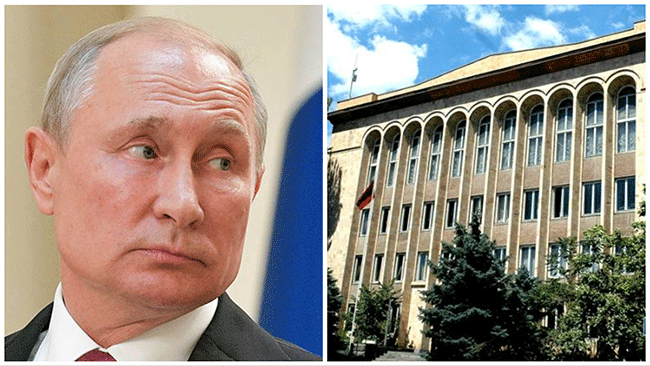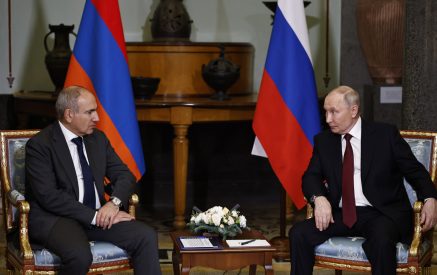The Government of Armenia, on January 3, 2023, applied to the Constitutional Court on the question of compliance with the Constitution of the obligations stipulated in the Rome Statute of the International Criminal Court and the declaration on the retroactive recognition of the jurisdiction of the International Criminal Court per Article 12, Part 3 of the Rome Statute signed on July 17, 1998.
On January 10 of this year, according to the decision of the Supreme Court in the case of “Determining the Compliance with the Constitution,” the obligations stipulated in the Rome Statute of the International Criminal Court, signed on July 17, 1998, were accepted for examination. It was decided to start the case investigation on February 14, appointing Judge V. Grigoryan as a reporter.
However, on February 10, the CC postponed the case hearing and set it for March 10, based on the procedural decision “Based on the need to study additional materials.” On March 10, “Based on the need to study additional materials,” the Constitutional Court again postponed the case hearing and set it for March 24.
The Constitutional Court of the Republic of Armenia on March 24, examining the Rome Statute of the International Criminal Court and the Declaration on the Retroactive Recognition of the Jurisdiction of the International Criminal Court by Article 12, Part 3 of the Rome Statute, and the question of compliance with the Constitution, the CCD-1680 decision decided that the obligations stipulated in them correspond to the Constitution. As usual, the CC examined by written procedure, which once again caused ridiculous comments, notably as if the President of the Russian Federation would be arrested after this decision.
Read also
However, the connection between the Constitutional Court of Armenia and its decisions with the head of another state is pretty unclear. At the same time, the figures who named themselves public and spread such comments couldn’t answer. The CC changed its message when it was first released because it was far from being an official message.
In the “first,” it was written that the Charter complied with the Constitution. “However, there were special opinions of CC judges.” In the official second edited version, the information about the special opinions was removed and as of yesterday, the session minutes had not been posted on the website, although the CC promised that the CCD-1680 decision would be fully published according to the law.
Remember that the Republic of Armenia signed the Rome Statute in 1999 on October 1, but in 2004, the decision of the CC stopped the ratification process. By the decision CCO-502 of August 13, by which the obligations of the Republic of Armenia stemming from the principle of complementarily underlying the jurisdiction of the International Criminal Court laid down in Part 10 of the Preamble, and Article 1 of the Rome Statute were recognized in Articles 91 and 92 of the Constitution (1995 edition) non-compliant with Articles (on the exclusivity of implementing criminal justice by the courts provided for by the Constitution). Let me remind you that the reporter in the 2004 case was Judge Kim Balayan of the CC.
Few people know that the “Tigran Mets” publishing house published the Rome Statute in a separate booklet in 2003, translated by Vladimir Hovhannisyan, former Deputy President of the CC, Chairman of the Council of the Armenian Association of International Law, and leading specialist, currently Judge Lianna Hakobyan. The International Committee of the Red Cross published it…
The Statute of the International Criminal Court was adopted on 1998 July 17, in Rome at the United Nations Plenipotentiary Diplomatic Conference. Of the states participating in the conference, 120 voted in favor of the Charter, seven voted against it (the USA, China, Iraq, Yemen, Qatar, Libya, and Israel), and 21 abstained. Let me touch on some of the articles of the Rome Statute that are of interest to us. According to the Charter, the court is an international legal entity.
According to Article 4, “Legal Status and Powers of the Court,” Clause 2, the Court may exercise its functions and powers under this Statute in the territory of any participating state or, by special agreement, in the territory of another state.
According to reasonable observers, the expectations of Armenians are determined by Article 5, “Crimes before the Court.”
The following crimes are sub-judges pending before the court:
- a) Genocide crime.
- b) Crimes against humanity;
- c) War crimes.
- d) Crime of aggression.
In other words, we can apply to the international court for aggression, genocide, and other crimes committed against us by Azerbaijan and neighboring states. Another court in The Hague passed a decision a month ago regarding the Lachine Corridor, which has not yet been implemented (by the way, only crimes committed after the entry into force of this Statute – RM) are subject to the court’s jurisdiction. According to Clause 2 of Article 11. “If a state becomes a party to this Charter after it enters into force, the court may exercise its jurisdiction only over crimes committed for that state after the entry into force of this Charter, unless that state has made a declaration under Article 12, Clause 3. Did” The statute of limitations does not apply to prejudicial crimes (according to Article 29).
According to Article 75 of the Criminal Code of the Republic of Armenia, the statute of limitations does not apply to persons who have committed crimes against peace and humanity under the relevant articles of the Criminal Code of the Republic of Armenia. Limitation periods are not applied to persons who have committed crimes provided for by international agreements of the Republic of Armenia if there is a prohibition to use a limitation period.
Of course, you and I are interested in whether the Rome Statute defines practical mechanisms for control of the decision in cases of non-implementation. In the context of the relationship between the UN Security Council and the International Criminal Court, uncertainty arises from the observations of some international law specialists in the case of aggression or a war crime. The prosecutor must have the SC decision on the existence of an act of aggression as the basis of the “accusation.”
Suppose the Security Council does not decide within six months of notifying the UN Secretary. In that case, the Prosecutor may initiate an investigation with the authorization of the Pre-Trial Chamber of the International Court of Justice.
Ruzan MINASYAN
“Aravot” daily, 28.03.2023























































